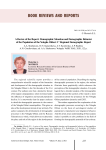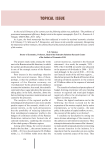Economic and Social Changes: Facts, Trends, Forecast @volnc-esc-en
Статьи журнала - Economic and Social Changes: Facts, Trends, Forecast
Все статьи: 1763
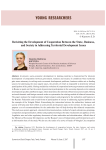
Статья научная
At present, socio-economic development in leading countries is characterized by intensive development of cooperation between government, business and society. In conditions when territories gain more autonomy in solving socio-economic development problems, business entities act as funding sources for addressing the most urgent issues, the priority of which is impossible to determine without participation of the public. Having studied the evolution of cooperation between government and business in Russia we point out that the extent of government participation in the economy depends on its national development specifics at different stages, which determines the diversity of their interaction models. Having reviewed domestic and foreign research works we systematize the existing models of trilateral interaction. The paper analyzes the implementation of joint projects and programs by the authorities and business in the Russian Federation and reveals forms of participation of society in addressing regional problems on the example of the Vologda Oblast...
Бесплатно
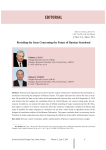
Revisiting the issue concerning the future of Russian statehood
Статья научная
National and regional surveys show that the expert community is dominated by pessimistic assessments concerning the prospects of Russia’s future. The paper discusses the reasons for such a situation. We provide the data on the results of the gubernatorial elections that were held September 9, 2018 and showed that the support for candidates from the United Russia, the current ruling party, has decreased. In addition, we analyze the open data of official reporting of major corporations from five Russian regions; it allows us to draw a conclusion about the existence of legislative conditions in Russia that make it possible for major taxpayers to minimize the tax base, which leads to significant losses of the budgets of constituent entities of the Russian Federation. The paper concludes that it is necessary for the President to make tough decisions aimed at improving the efficiency of the public administration system.
Бесплатно
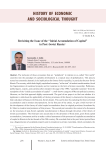
Revisiting the issue of the “initial accumulation of capital” in post-Soviet Russia
Статья научная
The inclusion of those economies that are “peripheral” in relation to so-called “first world” countries into the paradigm of capitalist development is a topical issue of globalization. This process turned out extremely dramatic in its implications for former Soviet republics, in particular for post-Soviet Russia. The country, which had a highly capitalized economy “at the start” of market transformation, faced the fragmentation of socialized property and its transition to the form of private ownership. Politicians, public figures, experts, and scientists often interpret the stage of the 1990s “capitalist transition” from the standpoint of the “initial accumulation of capital” - a well-known category of Marxist political economy. However, we find this approach highly controversial. The goal of our paper is to find out whether it is legitimate to talk about the applicability of the key provisions of this theory to characterize the processes that took place in Russia in the first post-Soviet decade. This can be done by analyzing the theory of initial accumulation and its modern interpretations. In the first part of the article, we give a brief overview of the development of the theory of initial capital accumulation from its original provisions formulated byK. Marx to modern interpretations of this process. The second part considers the content of a discussion on the processes of post-Soviet capitalist transformation in Russia through the prism of the theory of initial accumulation. The third part uses actual data on the dynamics of fixed assets, gross fixed capital accumulation, investment activity to make a critical assessment of the processes of capitalist accumulation of capital in Russia in the last decade of the 20th century. We conclude that in the post-Soviet period there was a fragmentation of socialized property and its transition to private ownership, which contradicts the key provisions of the concept of initial accumulation (liquidation of property of small producers and its socialization). The novelty of the obtained results lies in the fact that the historical process that took place in Russia in the last decade of the 20th century was defined as a process of appropriation and secondary redistribution of state property, accompanied by catastrophic processes of decapitalization.
Бесплатно
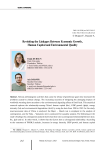
Revisiting the linkages between economic growth, human capital and environmental quality
Статья научная
Various anthropogenic activities that cause the release of greenhouse gases have increased the problems caused by climate change. The increasing necessity of mitigating the damaging impacts of worldwide warming draws attention to the environmental degrading effects of fossil fuels. This empirical research explores the relationship among China’s human capital (lhc), GDP growth (lgdp), energy intensity (lei) and environmental degradation (lco2) by using the data from 1990 to 2019. In this study, macroeconomic data of China is analyzed; the Bayer - Hanck test is employed in the analysis of cointegration, and the Toda - Yamamoto test is conducted for causality analysis. The following are the study’s findings: the cointegration analysis shows that there exist a cointegrated relationship between lco2, lhc, lgdp and lei. In other words, it shows that the factors have a cointegrated relationship. According to the outcomes of FMOLS analysis, increases in energy intensity, GDP growth, and human capital increase carbon dioxide releases in the long term. As evidenced by the findings, improvement in energy efficiency is associated with favorable outcomes for the environment, though economic expansion and the augmentation of human capital are linked to adverse effects on environmental conditions. The Toda - Yamamoto causality test has yielded results indicating the presence of causality links between human capital and carbon emissions, as well as between human capital and energy intensity. Furthermore, it has been observed that the former variable exerts a unidirectional influence on the latter. There is also a unidirectional causality from all variables to carbon emissions, GDP growth and energy intensity, respectively.
Бесплатно
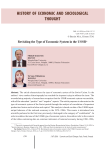
Revisiting the type of economic system in the USSR
Статья научная
The article characterizes the type of economic system of the Soviet Union. In the authors' view, modern historiography has reached the impasse trying to address the issue. The overwhelming majority of researchers recognize that the USSR economic system was socialist, with all the attendant “positive” and “negative” aspects. The article proposes to characterize the type of economic system of the Soviet period through the analysis of correlation of important production factors such as labor and capital. This analysis is based on data of the USSR input-output balances of the national economy in the 1970-1980s. This source is introduced into scientific parlance for the first time; previously, it belonged to the category of “confidential”. In order to address the issue of the USSR type of economic system, the authors refer to the content of the tables containing data on common indicators of national economy during 1980-1986, the proportion of direct and materialized labor in total labor costs for 1975-1985, and the ratio of the number of the Soviet workers involved in mechanized and manual labor for 1975-1985...
Бесплатно
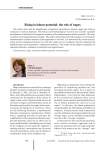
Rising in labour potential: the role of wages
Статья научная
The article deals with the identification of empirical interrelations between wages and rising in realization of labour potential. Theoretical and methodological research base includes copyright developments in the field of sociological evaluation of the implementation of labor potential. The study revealed a motivational function of wages. The author substantiated the role of wages in increasing the implementation of labour potential of the population in our time. It is shown that the current practice of pay and its institutional features are such that wages are not an effective tool for enhancing the implementation of the population’s employment potential. The results will be helpful to employees of regional authorities, managers of enterprises and organizations.
Бесплатно
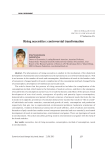
Rising necessities: controversial transformation
Статья научная
The phenomenon of rising necessities is studied in the mechanism of the dialectical development of production and consumption and is represented as a set of interrelated aspects. This is an increase in the number of needs and consumption; distribution of needs in the broader circle of consumers; changed quality of needs; complication of the consumption method; changed forms of consumption; development of intellectual and social needs. The article shows that the process of rising necessities includes the complication of the consumption method, which leads to the formation of needs in services, and then to the emergence of social forms of consumption and services. It reveals the features and effects of this process: broad development of non-vital needs, emergence of quality and quantity hyper-consumption, demonstrative consumption and pursuit of brands; existence of antisocial needs that turns the rise in needs in its opposite; prevalence of consumer demand over income that results in “life on credit” of individuals and entire countries; unrestrained growth of needs, consumption and production respectively that give rise to unprecedented environmental pollution; hedonistic orientation of consumption, violation of dialectical connection of needs-abilities, crisis of culture and morality; formation of poly-needs that combine several components (material and non-material); accelerated development of needs in communication, entertainment and games...
Бесплатно

Risk assessment of urban sectors to climate change in Istanbul
Статья научная
The aim of the present study is to investigate the risk of climate change on Istanbul. Istanbul is the largest city, in terms of both population and economic activity capacity, in Turkey meaning that any climate-related risk would be destructive not only for the city but also for the country. The urban system has been identified based on urban sectors that are the issues of activities, management areas, ecological systems, resources and species and critical for economic viability and public health of the city, also likely to be affected by climate-related disasters. 11 urban sectors and 25 sub-sectors, which are also presented as planning areas, have been determined considering the development strategies of Istanbul as water resources, health, energy, agriculture, transportation, development and land use, public safety, infrastructure, biodiversity and ecology, culture and materials. ICLEI’s handbook titled “Preparing for Climate Change: A Guidebook for Local, Regional and State Governments” guided the risk assessment of these planning areas and sectors. The data has been obtained via in-depth interviews with city stakeholders and the sectors have been ranked considering the risk factors of each. The results of this study reveal the urban sectors that are under the greatest and lowest risk due to the impacts of climate change. Highlighting the climate change risk on vital sectors of Istanbul is essential for decision makers to develop further strategies to mitigate the impacts of climate change and adapt the upcoming impacts.
Бесплатно
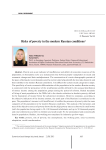
Risks of poverty in the modern Russian conditions
Статья научная
Poverty acts as an indicator of insufficiency and deficit of economic resources of the population; its boundaries serve as a demarcation line between people’s adaptation to social and economic changes and their maladjustment. The construction of a socio-demographic portrait of the poor, reflecting its recent dynamics and the current state helps identify the key risks of poverty and their stability in the modern Russian conditions. It is difficult for certain social categories to adapt. The specificity of socio-economic differentiation of the population in the modern Russian society is connected with the persistence of the stratification profile defined by the unequal distribution of money income among the population groups during the period of reforms. Raised standards of living of most population in the 2000s led to the drastic reduction in absolute poverty, defined by the boundaries of income below the subsistence minimum. However, nowadays, according to the objective indicators of the income amount, the tenth part of the Russians is considered as the poor...
Бесплатно
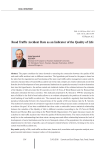
Road traffic accident rate as an indicator of the quality of life
Статья научная
The paper considers the issues devoted to assessing the connection between the quality of life and road traffic accident rate in different countries. The hypothesis put forward in the paper is based on the idea that the organization and functioning of the state road traffic safety management system and the outcome characteristics of road traffic accident rate in the road complex are closely related and are derived from the level of development of non-governmental institutions in a particular country. In order to determine how true this hypothesis is, the author carried out statistical studies of the relations between the estimates of the Quality of Life presented for 60 countries in the US News & World Report and the Human Risk indicators estimated for these countries. This indicator proposed by R. Smeed in 1949 for assessing the state of affairs in the field of road safety allows us to evaluate adequately the position of countries in the world ranking of road traffic accident rate...
Бесплатно
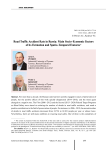
Статья научная
For more than a decade, the Russian state has been actively engaged in issues of preservation of people, but the positive effects of this work quickly disappeared (2014-2016), and the trend again changed to a negative one. The First (2006-2012) and the Second (2013-2020) Federal Target Programs on Road Safety were aimed at reducing the number of deaths in road traffic accidents, and made a positive contribution to the field of preservation of people. For instance, in 2006-2019, the annual number of deaths in road traffic accidents decreased from 32,724 to 16,981 people per year, or almost twice. Nevertheless, there are still many problems in ensuring road safety. One of them is the complexity of the system processes of road safety management in such a large country as the Russian Federation. Russia consists of 85 heterogeneously developed economically and socially entities on the territory of which representatives of 190 peoples live. The article analyses a wide range of issues related to the assessment of the impact of the sociocenosis features on one of the most important characteristics of road traffic accident rate - the severity. The purpose of the research is to study the influence of the characteristics of representative socio-economic factors on road traffic accident severity in Russian regions, and to develop the most effective differentiated approach to the financing of regional road safety programs on this basis. The scientific novelty of the research consists in the model confirmation of the previously put forward ideas about the positive impact of the basic socio-economic institutions that shape road users’ transport behavior on its safety. The authors consider these ideas in relation to Russia as a whole and to the relationship of regional road traffic accident rate with the economic and demographic characteristics of Russians’ life. The paper presents the rank patterns of influence on road traffic accident severity of such characteristics of regional sociocenosis as the population’s median age, the share of population with income below the minimum wage, and the average monthly income. We show the conceptual considerations for improving road safety in the Russian Federation in the spatiotemporal continuum.
Бесплатно
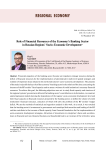
Статья научная
Financial capacities of the banking sector become an important strategic resource during the deficit of financial resources for the implementation of administrative multi-level spatial strategies and solution of important issues related to the territorial systems' socio-economic development. The purpose ofthestudyistojustifythekeyroleoftheeconomy'sbankingsectorinthesolutionoftheissueconcerningthe increase of the RF entities' fiscal capacity and to assess a volume of credit institutions' necessary financial resources. To achieve this goal, the following objectives were set: to study fiscal capacity and structure of the regional systems' government debt and the banking sector's contribution to its formation, to construct spatial regression models showing the dependence of the regions' socio-economic development level and their fiscal capacity on financial resources attracted by the banking sector, to define the volume of credit institutions' financial resources, attraction of which will solve the problem of the RF entities' budget deficit. We use the methods of statistical and regression analysis in this work. As a result, it was revealed that the banking sector's investments in government and municipal debt securities and lending of the RF entities contribute to the increase of fiscal capacity, form financial foundation for the implementation of socio-economic development strategies. Attraction of investments in enterprises' shares and securities, loans to financial and non-financial business and households lead to an increase of the territories' gross regional product. The results of this study may be useful for the government authorities of the RF entities while implementing the developed spatial socio-economic development strategies.
Бесплатно
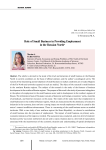
Role of small business in providing employment in the Russian north
Статья научная
The article is devoted to the study of the level and dynamics of small business in the Russian North in current conditions on the basis of official statistics and the author's sociological survey. The reasons of the functioning and development of small business in market conditions are revealed. Regions of the Far North and territories equated to such are studied. The object of the research is small business in the northern Russian regions. The subject of the research is the study of the features of business development in the northern Russian regions. The purpose of this work is the study of processes taking place in the sphere of employment in the small business sector and its development in the northern regions of Russia. The information basis of this paper consists of domestic and foreign economists' works, materials of periodicals, and Internet resources on this topic. The results of the study show that employment in small businesses in the northern Russian regions, which are characterized by the dominance of extractive industries in the economy, does not have a strong impact on overall employment which is caused by this sector's current insufficient advancement. There is a narrowing of the small business sector on studied territories. With a case study of one northern region (the Komi Republic), we showed a contribution of small business into the provision of employment. The impact of small business on primary socio-economic indicators of the region is revealed. The assessment was conducted, and a low level of residents' business activity was noted: northerners do not seek to open a business due to a low level of expectations associated with the improvement of the economic situation and understanding of spatial development problems on the territory of residence. The main reasons of northerners' low business activity are the lack of entrepreneurial skills, the lack of start-up capital and difficulties with its attraction. The key directions of the increase of employment in the small business sphere of the northern regions are highlighted.
Бесплатно
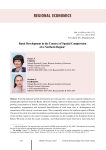
Rural Development in the Context of Spatial Compression of a Northern Region
Статья научная
Ensuring balanced spatial development and reducing inter- and intra-regional imbalances are strategically important issues for Russia. However, finding a solution to these issues is complicated by the growing concentration of human, industrial, and scientific potential in large cities, major cities, and metropolises, depopulation and economic desertification of rural areas, that is, disintegration and compression of the country’s economic space. This is especially acute in the northern regions of Russia. The aim of the article is to study the problems and determine the prospects for development of rural areas of the northern region in the context of spatial compression on the example of the European North of Russia. We point out that the social, economic, and infrastructural issues observed in rural areas have remained unresolved since the 1990s. Rural population decline caused by the destruction of the socioeconomic potential of these territories is a key factor in the compression of the space of the northern region, degradation of the village and loss of its human capital. The reason lies not only in the shock transition to the market in the 1990s, but also in the ineffective state policy for rural development in the post-reform period, and in the absence of a strategic vision of the place of rural territories in the national space. Having analyzed the current state of the rural periphery and taking into account the need to shift to neo-endogenous rural development, we identify three priorities of state policy in the field of rural development in the North of Russia. They are as follows: development of the rural economy, modernization of rural infrastructure, and comprehensive development of human capital as the ultimate goal of all economic and social transformations. The findings of our work contribute to the formation of ideas about trends in spatial development of the northern regions of Russia and socio-economic issues of rural areas; they can be used by researchers in their studies on similar topics, and by public authorities when they need to work out strategic documents in the field of spatial development.
Бесплатно
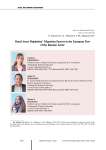
Rural areas population’ migration factors in the European part of the Russian Arctic
Статья научная
The study of migration remains relevant, despite the presence of a wide range of papers by authors from Russia and other countries on the subject. The features of migration processes, in particular migration factors, in rural areas of the Arctic zone of the Russian Federation are of the greatest interest due to the current accumulation of sufficient amount of data for analysis. The article considers seven municipalities of the European part of the Russian Arctic and empirically determines statistically significant migration factors through correlation analysis. Data on 15 indicators were collected from 2008 to 2021. We reveal that the most significant migration factors are the development of education, the situation regarding transport links, food and financial security of the population, and housing provision. At the same time, the combination of statistically significant factors is unique for each individual municipal entity. The thesis, widespread in the migration theory, about the greater influence of economic factors on the dynamics of migration was only partially confirmed in the case of the rural areas under consideration. It was found that individual indicators, such as agricultural production and employment, generally do not affect migration decline (increase), and the established relationship with such an indicator as wage level cannot be interpreted unambiguously. With the growth of labor incomes, the outflow of rural residents from their native areas reduces, but does not disappear completely. In turn, the increase in nominal wages is to a large extent a reflection of the inflationary effect; therefore, it cannot be an effective mechanism for retaining the rural population.
Бесплатно
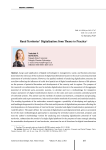
Rural territories' digitalization: from theory to practice
Статья научная
Large-scale application of digital technologies in management, social, and business processes determines the relevance of the inclusion of digital transformation factors in the socio-economic potential assessment of territorial systems. However, the applied methods of analyzing digitalization processes do not allow reflecting the influence of multi-level spatial set of digital transformation factors of life spheres on the process of potential formation and development of the country and its regions. The purpose of the research is to substantiate the need to include digitalization factors in the assessment of the aggregate potential of territorial socio-economic systems, to develop and test a methodology for integrative impact assessment of digital transformation factors on the state and socio-economic potential growth of territorial systems. The author uses the methods of analysis and synthesis, comparison and grouping, generalization and expert assessments, index and correlation methods of economic and statistical analysis. The working hypothesis of the undertaken research suggests a possibility of developing and applying a methodological approach to the analysis of the state and dynamics of digitalization processes reflecting the interdependence of characteristics of rural territories' potential and digital transformation parameters of rural life sphere. The paper defines the concepts of digitalization and digital potential, gives an annotated list of the main methodological approaches to assessing the territorial system's potential, proposes and tests the author's methodology version for analyzing and evaluating digitalization potential of rural territories, substantiates the model of a single digital platform for the purposes of state strategic planning for sustainable development of rural territories, structures the set of directions for digital transformation of region's life subjects, and forms a multi-level set of indicators for comparable assessment of the state and dynamics of digital transformation development which is useful for developing options for setting priorities when justifying strategic decisions in digitalization. The scientific novelty of the research is that for the first time there was an attempt to develop a methodological approach to assessing territorial system potential taking into account the factors of digital transformation of processes in the field of production, exchange, distribution, and consumption of public products.
Бесплатно
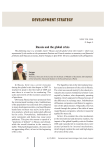
Статья научная
The following issue is a scientific report “Russia and the global crisis: first results”, which was represented by the author at the permanent Russian and French seminar on monetary and financial problems of the Russian economy, held in Vologda in April 2010. The text is published with abridgement.
Бесплатно
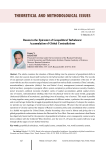
Russia in the epicenter of geopolitical turbulence: accumulation of global contradictions
Статья научная
The article examines the situation of Russia falling into the epicenter of geopolitical shifts in 2022, when the country found itself involved in the hybrid warfare with the Collective West. The novelty of our approach consists in reconstructing key events of the geopolitical competition of the last 15-20 years with the use of an extensive range of related concepts from various fields: economics (Trout’s mistake, neocolonialism), cybernetics (Ashby’s Law and Sedov’s Law), management (external management, hybrid warfare), synergetics (synergetic effect, system complexity), political science (security, freedom, power structure), political economy (Arrighi’s cycles of capital accumulation, global capital center, rate of return), institutionalism (shifting risks from the physical world to the social world), geography (horizontal diffusion of innovations), psychology (war of meanings, war of nerves). This made it possible to bring together many poorly compatible phenomena of different nature, synthesize the concepts used and reveal the logic behind the struggle of geopolitical players for world hegemony. To deepen the analysis, we provide our own typology of world wars and their characteristics. We prove that the special military operation in Ukraine exposed the impasse of Russia’s economic policy and consolidated other countries in a hybrid war against the United States, thereby becoming a key event in history and giving rise to a global geopolitical confrontation between the West and the Non-West. Our main conclusion is that Russia has objectively found itself in the epicenter of geopolitical turbulence, and, consequently, cannot avoid a direct collision with the Collective West; therefore, over the next 15-20 years the country will have to go through all the stages of a new hybrid world war.
Бесплатно

